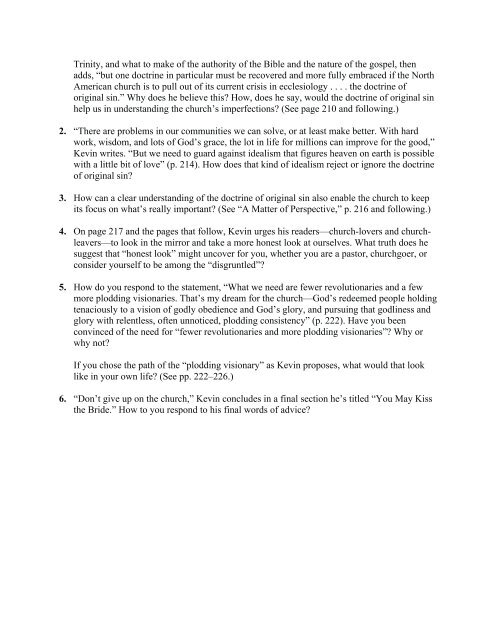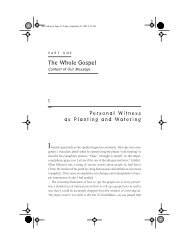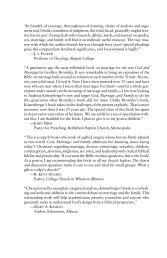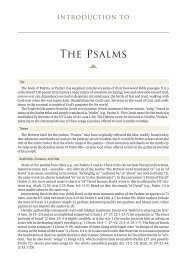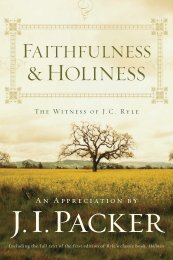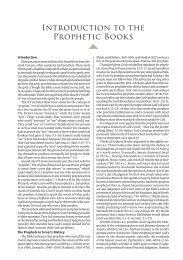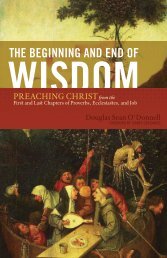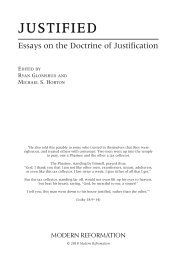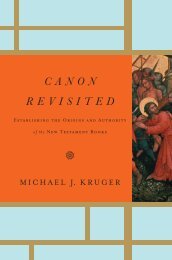Why We Love the Church: In Praise of Institutions and Organized ...
Why We Love the Church: In Praise of Institutions and Organized ...
Why We Love the Church: In Praise of Institutions and Organized ...
Create successful ePaper yourself
Turn your PDF publications into a flip-book with our unique Google optimized e-Paper software.
Trinity, <strong>and</strong> what to make <strong>of</strong> <strong>the</strong> authority <strong>of</strong> <strong>the</strong> Bible <strong>and</strong> <strong>the</strong> nature <strong>of</strong> <strong>the</strong> gospel, <strong>the</strong>nadds, “but one doctrine in particular must be recovered <strong>and</strong> more fully embraced if <strong>the</strong> NorthAmerican church is to pull out <strong>of</strong> its current crisis in ecclesiology . . . . <strong>the</strong> doctrine <strong>of</strong>original sin.” <strong>Why</strong> does he believe this? How, does he say, would <strong>the</strong> doctrine <strong>of</strong> original sinhelp us in underst<strong>and</strong>ing <strong>the</strong> church’s imperfections? (See page 210 <strong>and</strong> following.)2. “There are problems in our communities we can solve, or at least make better. With hardwork, wisdom, <strong>and</strong> lots <strong>of</strong> God’s grace, <strong>the</strong> lot in life for millions can improve for <strong>the</strong> good,”Kevin writes. “But we need to guard against idealism that figures heaven on earth is possiblewith a little bit <strong>of</strong> love” (p. 214). How does that kind <strong>of</strong> idealism reject or ignore <strong>the</strong> doctrine<strong>of</strong> original sin?3. How can a clear underst<strong>and</strong>ing <strong>of</strong> <strong>the</strong> doctrine <strong>of</strong> original sin also enable <strong>the</strong> church to keepits focus on what’s really important? (See “A Matter <strong>of</strong> Perspective,” p. 216 <strong>and</strong> following.)4. On page 217 <strong>and</strong> <strong>the</strong> pages that follow, Kevin urges his readers—church-lovers <strong>and</strong> churchleavers—tolook in <strong>the</strong> mirror <strong>and</strong> take a more honest look at ourselves. What truth does hesuggest that “honest look” might uncover for you, whe<strong>the</strong>r you are a pastor, churchgoer, orconsider yourself to be among <strong>the</strong> “disgruntled”?5. How do you respond to <strong>the</strong> statement, “What we need are fewer revolutionaries <strong>and</strong> a fewmore plodding visionaries. That’s my dream for <strong>the</strong> church—God’s redeemed people holdingtenaciously to a vision <strong>of</strong> godly obedience <strong>and</strong> God’s glory, <strong>and</strong> pursuing that godliness <strong>and</strong>glory with relentless, <strong>of</strong>ten unnoticed, plodding consistency” (p. 222). Have you beenconvinced <strong>of</strong> <strong>the</strong> need for “fewer revolutionaries <strong>and</strong> more plodding visionaries”? <strong>Why</strong> orwhy not?If you chose <strong>the</strong> path <strong>of</strong> <strong>the</strong> “plodding visionary” as Kevin proposes, what would that looklike in your own life? (See pp. 222–226.)6. “Don’t give up on <strong>the</strong> church,” Kevin concludes in a final section he’s titled “You May Kiss<strong>the</strong> Bride.” How to you respond to his final words <strong>of</strong> advice?


